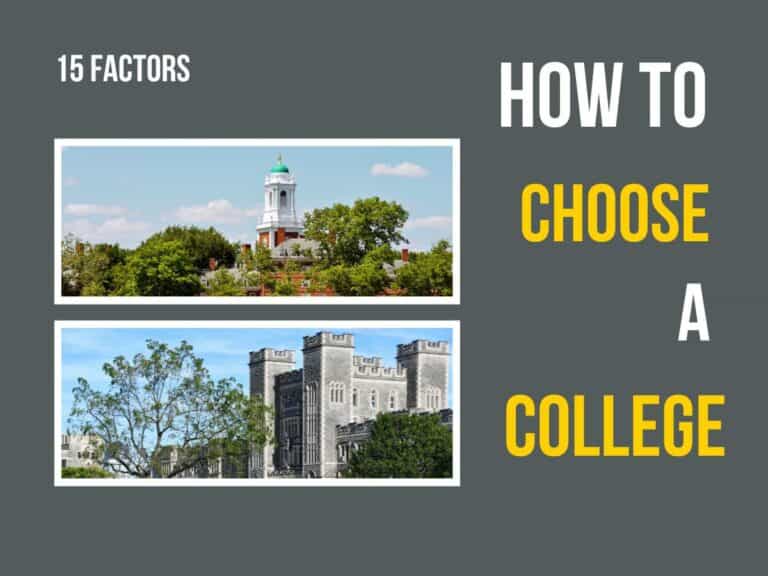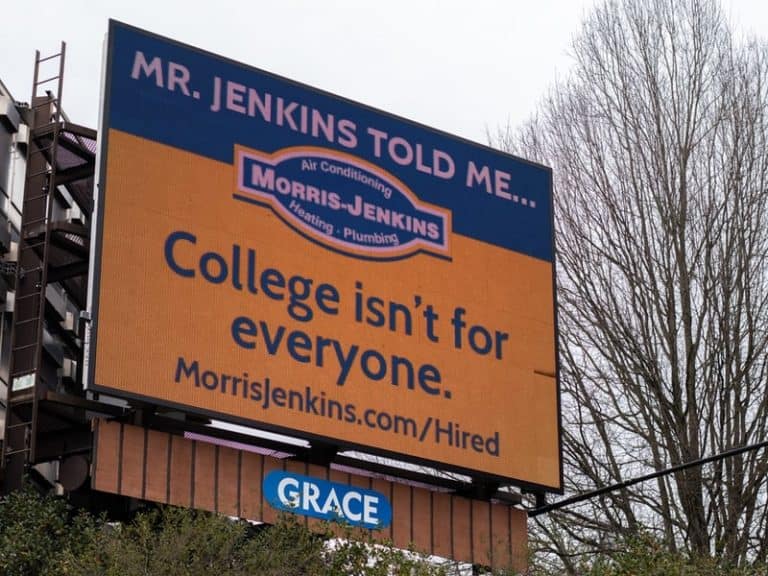Do You Have To Be Smart To Go To College?
Traditional or holistic, a college applicant’s high school GPA is an important consideration.
It may not be the only factor college admissions officers check out when reviewing applications, but the GPA remains the top criterion in college admissions.
Most people associate GPAs with intelligence.
Students with a low GPA, they assume, are not good enough for college.
Fortunately, many students with low GPAs can go to college — they should not allow their grades to keep them from pursuing a bachelor’s degree.
Intelligence is too complex to be measured accurately by the GPA alone.
Many factors contribute to a low GPA, meaning it doesn’t necessarily reflect a high school teen’s intelligence level or ability to attain college success.

The Low-Down on Low GPAs
Please refrain from assuming that a student whose GPA is lower than yours is not as bright as you.
While it’s not uncommon for teens who are not intellectually gifted to suffer from low grades, a low GPA is not always a result of one’s inability to perform well academically.
Lack of Interest
Some teens may feel that knowing how to balance chemical equations or the things that happened centuries ago is completely pointless, thus finding no interest in diligently doing their coursework.
To them, it’s better to spend their time on things that have more meaning in a personal sense.
Bad Study Habits
According to research, around 85% of students perform poorly in the classroom due to lack of study techniques.
Studying is an art, and there’s a right way to do it.
High school students who procrastinate, get easily distracted, cram, multitask, and are disorganized have poor study habits, which can keep them from having good grades and, ultimately, a high GPA.
Do you have to be brainy to go to college?
For someone whose problem is not studying right, having good study skills is a must to go to college.
Poor Time Management
Being bright is pointless if the student is having trouble prioritizing the books.
Whether the individual has a part-time job or a star student-athlete, it’s not unlikely for the grades to suffer if unable to balance various commitments properly.
With a low GPA, one may assume, “I’m not smart enough for college.”
In some instances, the student may just have trouble with time management.
Learning Disabilities or Disorders
Some students are just as intelligent as everybody else.
However, their brains receive and process information differently, which can keep them from learning new information and skills and also applying them.
A teen with a learning disability or disorder isn’t dumb or lazy — teaching the individual in a manner that suits one’s needs will prove that academic success is possible.
Low-Income Household
It’s common for high schools in poor districts to have inexperienced teachers and poor instructional materials due to receiving less funding from the government.
Because of this, students attending them may have bad grades.
True enough, the US Government Accountability Office (GAO) says that teens attending high-poverty schools tend to struggle to attain GPAs high enough for admission to some four-year institutions, particularly selective ones.
Extenuating Circumstances
While most high schoolers spend most of their waking hours on campus, many of them also face a lot of challenges outside the classroom, ranging from family issues to romantic relationships.
Various external factors can get in the way of their studies, thus causing them to get bad grades.

What to Do If the GPA is Low
Do you have to go to college if your GPA is low?
Whether or not you should go to college is not a matter of how good or bad your GPA is — it’s all about your academic and career goals, which you should establish beforehand.
Of course, everyone knows the important role the high school GPA plays in college admissions.
Because of this, it’s a good idea to consider various options appropriate for your grades to avoid wasting time.
Apply to Open-Enrollment or Less Selective Colleges
Regardless of the GPA, students are more likely to get into certain colleges.
As a matter of fact, some schools are guaranteed to admit them.
Colleges with open-enrollment or open-admissions policy have a 100% acceptance rate, welcoming those with a high school diploma or something equivalent to it, like a GED certificate.
Some of the best open-enrollment colleges include:
| Institution | Location |
|---|---|
| Bellevue University | Bellevue, NE |
| Cameron University | Lawton, OK |
| Lewis-Clark State College | Lewiston, ID |
| Missouri Western State University | St. Joseph, MO |
| New Mexico Highlands University | Las Vegas, NM |
| University of Texas at El Paso | El Paso, TX |
| University of the Potomac | Washington, DC |
| Utah Valley University | Orem, UT |
| Wayne State College | Wayne, NE |
Besides colleges that admit anyone who finished high school, you may also consider less selective institutions with very high acceptance rates, sometimes admitting almost all applicants.
Here are schools from various states that accept 80% or more of applicants:
| Institution | Location | Acceptance Rate |
|---|---|---|
| University of Alabama at Birmingham | Birmingham, AL | ~92% |
| University of Alaska Anchorage | Anchorage, AK | ~81% |
| University of Arizona | Tucson, AZ | ~84% |
| University of Central Arkansas | Conway, AR | ~91% |
| California State University Stanislaus | Turlock, CA | ~86% |
| University of Colorado Boulder | Boulder, CO | ~82% |
| University of New Haven | West Haven, CT | ~84% |
| Barry University | Miami Shores, FL | ~91% |
| University of North Georgia | Dahlonega, GA | ~81% |
| University of Hawaii at Manoa | Honolulu, HI | ~84% |
| Boise State University | Boise, ID | ~81% |
| Illinois State University | Normal, IL | ~89% |
| Indiana State University | Terre Haute, IN | ~90% |
| The University of Iowa | Iowa City, IA | ~83% |
| Kansas State University | Manhattan, KS | ~93% |
| University of Kentucky | Lexington, KY | ~94% |
| Northwestern State University | Natchitoches, LA | ~82% |
| University of Maine | Orono, ME | ~92% |
| St. Mary’s College of Maryland | St. Mary’s City, MD | ~80% |
| Salem State University | Salem, MA | ~85% |
| Western Michigan University | Kalamazoo, MI | ~81% |
| Concordia University – St. Paul | Saint Paul, MN | ~97% |
| University of Mississippi | University, MS | ~88% |
| Missouri State University | Springfield, MO | ~85% |
| University of Montana | Missoula, MT | ~88% |
| University of Nebraska – Omaha | Omaha, NE | ~82% |
| Nevada State College | Henderson, NV | ~81% |
| New England College | Henniker, NH | 100% |
| New Jersey City University | Jersey City, NJ | ~96% |
| Western New Mexico University | New Mexico | 100% |
| Iona College | New Rochelle, NY | ~88% |
| University of North Carolina – Asheville | Asheville, NC | ~94% |
| North Dakota State University | Fargo, ND | ~93% |
| Cleveland State University | Cleveland, OH | ~88% |
| The University of Oklahoma | Norman, OK | ~78% |
| University of Oregon | Eugene, OR | ~83% |
| Washington & Jefferson College | Washington, PA | ~82% |
| Bridgewater State University | Bridgewater, MA | ~90% |
| Columbia College | Columbia, SC | ~96% |
| University of South Dakota | Vermillion, SD | ~86% |
| University of Memphis | Memphis, TN | ~84% |
| The University of Texas – Arlington | Arlington, TX | ~80% |
| Utah State University | Logan, UT | ~89% |
| Northern Vermont University – Johnson | Johnson, VT | ~84% |
| George Mason University | Fairfax, VA | ~81% |
| Western Washington University | Bellingham, WA | ~88% |
| Concord University | Athens, WV | ~89% |
| University of Wisconsin – Stout | Menomonie, WI | ~90% |
| University of Wyoming | Laramie, WY | ~96% |
Consider Attending a Community College
While the answer to the question “do you have to be smart to go to university?” is a yes, that’s an incomplete answer — a more complete one would be yes, you have to make smart choices.
Do you have a low GPA because of your part-time job or need to care for a sick family member?
Being smart about pursuing a college degree is a must.
For example, you may instead consider taking your application to a community college, which usually has a much higher acceptance rate than a four-year institution.
Refrain from assuming that only academically challenged students go to these two-year institutions — many of them are just as intelligent and hard-working as those at four-year institutions.
At a community college, you can prove that you can get a high GPA.
After two years, present your impressive GPA to your dream four-year college, earn as much credit as you can, and you could be halfway to getting a bachelor’s degree.
Look Into Trade Schools
Have trouble finding the logic behind studying the elements or speaking French?
Maybe it’s not your intelligence that’s behind your low GPA — it could be because you see traditional learning as far less important for the attainment of your preferred career than other students do.
Programs at trade or career schools are much shorter than those at two- and four-year institutions.
This means that you can get out of one in no time, letting you start your chosen career ASAP.
It’s not a question of “am I too dumb for college?” why you may consider attending a trade school instead,
It’s more about you knowing what you want to do in life, and you want to be able to do it quickly.
Show You Can Shine Outside the Classroom
Many colleges have holistic admissions.
It means that their admissions officers make decisions based on the various components of a candidate’s application, from extracurricular activities to volunteer work.
You can increase your chances of getting in by looking for ways to make up for your low GPA.
For instance, you may highlight activities demonstrating leadership skills or write compelling supplemental essays where you talk about why the college is the best-fit school for you.
Disclaimer: The views and opinions expressed in this article are those of the authors and do not necessarily represent those of the College Reality Check.





